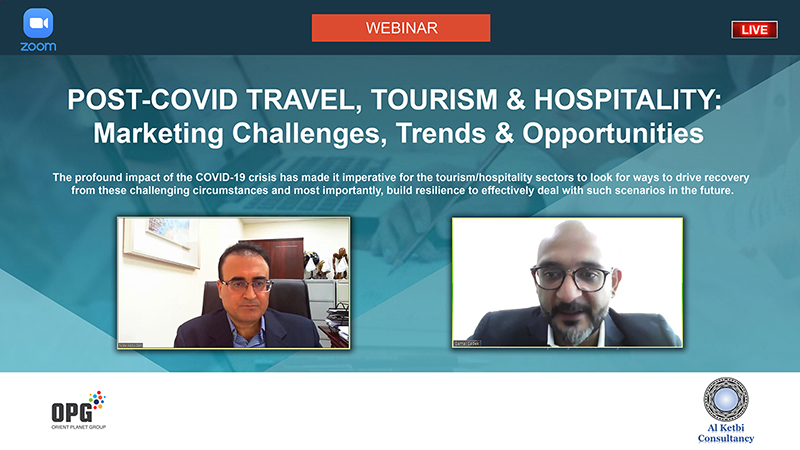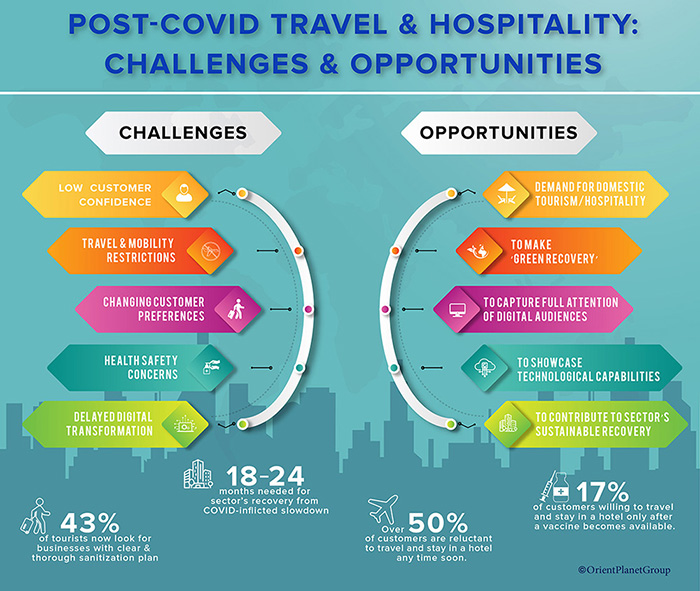Media
Swift adaptation to post-COVID trends & digital transformation key to region’s travel & hospitality recovery
Webinar highlights the importance of data-driven marketing strategies
The recovery of the region’s travel, tourism and hospitality, arguably the most affected sector globally by COVID-19, will be slow and could take up to 24 months, opined experts during a webinar that took place in Dubai recently. The session titled ‘Post-COVID Travel, Tourism & Hospitality: Marketing Challenges, Trends and Opportunities’ underlined the need for companies operating in the sector to revamp marketing strategies and harness the potential of data to effectively address the needs of post-COVID travelers and guests, in order to accelerate recovery and drive growth. The webinar was organized by Orient Planet Group in partnership with Al Ketbi Tourism and Hospitality Consultancy.

“With countries progressively easing travel restrictions and border controls, proactive efforts are needed from the side of travel, tourism, and hospitality companies in the region, especially in terms of marketing to get their businesses back on track,” said Gamal Sadek, General Manager, Al Ketbi Tourism and Hospitality Consultancy, and a speaker at the webinar. “Data analysis must be utilized to narrow down target audiences and design marketing strategies specifically for them. By following this approach, brands have a better chance of attracting the right customers and better ROI. For instance, the integration of Yield Management enables travel/hospitality companies to sell the right service to the right customer at the right time.”
“The pandemic has led to a paradigm shift in the consumer behavior, changing the way they think, work, shop, travel and holiday. Health safety is now the number one priority of customers and marketing strategies should reflect this,” said Nidal Abou Zaki, Managing Director of Orient Planet Group and a speaker at the webinar. “A recent travel sentiment study revealed that 43% of tourists now look for brands with a clear and thorough sanitization plan. Given the global impact of the pandemic, it is safe to assume that this reflects the collective sentiments of travelers all over the world.”

“Although GCC’s travel, tourism and hospitality markets are likely to recover at a faster pace in comparison with their global counterparts, this could still take up to 18-24 months. Therefore, businesses operating in these sectors must prepare themselves for continued losses in revenues, renegotiation of contract terms with suppliers, placing more employees on unpaid leave and even partial suspension of operations,” continued Abou Zaki.
Measures to flatten the COVID-19 curve such as community lockdowns, social distancing, stay-at-home orders, travel and mobility restrictions as well as rising health safety concerns of people have given rise to new trends in travel and tourism. Apart from an increasing demand for domestic tourism/hospitality experiences, a large majority of consumers are currently spending more time on in-home media consumption. These shifts present an ideal opportunity before travel and tourism marketeers to change their focus to domestic audiences and roll out creative and interactive content to effectively engage with them. Moreover, coming up with imaginative ideas such as the launch of ‘work from hotel’ deals for those who are looking for a change of scene from ‘working from home’ could also pay off.
Some leading travel and tourism brands in the region are already exploring innovative digital campaigns such as streaming of live events, virtual experiences, influencer partnerships, wellness and cooking vlogs and social media contests using User Generated Content (UGC) to engage audiences in meaningful ways. Apart from these, they are also generating buzz around enhanced sanitization and disinfection around their properties through digital platforms and launching innovative welcome-back promos that offer free staycations and travel. However, a majority of them are still lagging behind in terms of accelerating the shift from traditional to digital marketing tools.
As the easing of travel limitations unlikely to immediately restore the sector’s activities back to pre-pandemic levels, travel and hospitality players that are reluctant to adapt to these changes might find themselves losing out to their competitors. This is particularly important as more than 50% of customers surveyed are reluctant to travel and stay in a hotel any time soon. While only around one-third are prepared to go on vacation and book a hotel room in the next few months, 17% of customers are willing to travel and stay in a hotel only after a vaccine becomes available. In terms of the expectations of the post-COVID customers, they now prefer brands that effectively address their safety concerns, give them individual attention, offer integrated experiences and great value for money.
In light of the evolving market trends, the webinar further discussed the priorities of post pandemic customers, and how travel and hospitality players can in fact turn these challenges into opportunities to gain competitive advantages and build brand loyalty. Furthermore, participants agreed on the need to adapt quickly to the shifting trends and customer preferences; create innovative virtual experiences; implement flexible cancellation policies; and create campaigns that encourage tourists to plan their future travels now.
